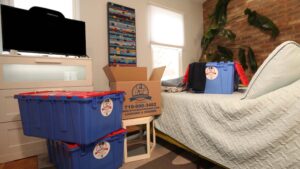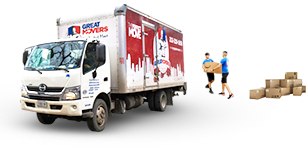Complete Guide to Moving into Your First Apartment in NJ

Table of Contents
So, you’re ready to leave the nest and move into your first apartment. As exciting as that is, it can also be nerve wracking. Moving at any point in your life can be stressful, but it’s doubly so when you’re getting started with your new life. Although you might not be able to reach a state of zen during your first move, this guide can help plan your moving strategy so you’re not hit with any surprises.
Make Simple Financial Preparations in Your Budget
Moving isn’t cheap. There are a lot of different factors you need to consider when it comes to living on your own. Even if you end up living with roommates, there are still responsibilities and bills you might not be used to, especially if you’ve been living at home. If you’re not sure if you’re ready to live on your own, here are some key financials you should consider before you start looking for a new place:
Income – it goes without saying that in order to pay for your rent and utilities you’ll need to bring in some money. More importantly, most apartments require you to prove that you have an income and will generally ask for the last several months of pay stubs. Depending on where you live, some landlords might even ask that your salary equals around 40x the monthly rent.
If you don’t have a job yet because you just graduated college or you’re starting over in a new city, you might not be able to provide proof of income. In these cases, you can ask a parent or guardian to act as a guarantor for you when signing the lease. This way, the management company will at least know that someone will cover the monthly rent. Ideally, you’ll be able to find some source of income shortly after moving into your apartment.
Budget – Before you start looking for apartments, take a look at your budget. If you haven’t made one or updated it recently, you can use sites like Mint or You Need a Budget to help keep track of your expenses and set a goal to save up for your move. Make sure to include budgets for any bills, payments, debts, savings, and spending money you want for clothes, travel, restaurants, bars, etc.
Once you have set everything up, see how much money you currently have leftover that you can spend on rent and utilities. Depending on where you want to move, this might mean you need to set aside $800-$1,000. In more popular cities, you might have to budget for at least $1,500 if you don’t want roommates. Of course, there is always the roommate option, which we will get to later on.
Save for fees – Most apartments and even roommate situations will ask for a chunk of money upfront when you sign a new lease. These fees include an application fee, security deposit (usually the same amount of one month’s rent), administration fee, and at least the first month’s rent though some might ask for last month’s rent as well. If you used a broker, you might also be required to pay a broker’s fee. All in all, if you’re looking to rent an apartment for $1,500/month you may need to save up close to $5,000 depending on what your landlord/management company requires.
This doesn’t even account for the actual cost of moving. Whether you rent a truck or hire a professional moving service, you’ll need to set aside some money to pay for it. Even if you rent a truck, these can cost between $50-$200 depending on the size you need, the distance you travel, and how long you rent it out for. While renting a truck is the cheapest option, you will have to do all of the loading and unloading yourself, which is grueling work and can often lead to injuries. While hiring professional movers might be more expensive, it ultimately will save you a lot of time and even money in the long run. Depending on how much you need to move, hiring movers can cost anywhere between $300-$1,500. It’s up to you to decide whether you want to do a DIY move or not so make sure to weigh the pros and cons of each option.
Finding the Right Apartment Based on Your Needs
Your finances will be the most defining parameter in finding a place to live. Having a steady income and saving up in advance will open up a lot more options when it comes to apartment hunting. However, if saving up that much cash isn’t feasible, there are other options available:
Start your search early – if you know you’re going to need a place to live in the next few months, get a head start. May-August tends to be the busiest season for rentals so if you want a good deal, you’ll have to start looking as soon as possible. If you are able, the best time to get a good deal is to look in the off season so anywhere between October-February. While there aren’t as many rentals on the market, most landlords or management companies are more willing to negotiate on the rates as there aren’t as many people moving during this time.
Get a roommate (or 2) – this way you can cut your rent by at least 50 percent allowing you to get to your target rent amount and also cutting your bills in half as well. If you have a friend or acquaintance who also happens to be moving at the same time, ask if they are interested in moving in together. Of course, before you decide to live together, you should first assess your own needs when it comes to roommates. Do you prefer a quiet and clean environment? What are your thoughts on smoking and/or pets? You should spend some time to hash out both you and your potential roommates needs and see if they actually mesh. It won’t work if you want a quiet apartment but your roommate is someone who likes to bring the party home, for example. If you don’t have anyone you know moving, you can still find a roommate through various sites and apps. When going in for the interview, make sure to ask questions about their lifestyle and understand what the other person requires from you to see if it will work out before you decide to move in.
Look outside the major city hub – The most expensive apartments tend to be where all the action is located. While it’s great to be in the center of the action, if you can’t swing the expensive rent, you’ll have to look outside of the area. Many apartments that are 30 minutes outside the main hub will offer much cheaper rents. If you take the time to look around you might even be able to spot some great up and coming areas that offer a lot of amenities you want for a cheaper price than the main city.
Consider utilities – For most apartments, the monthly rent just covers the actual cost of your room. However, some might lump in some utilities. Many apartment complexes are required to provide the basics in your rent including heat and hot water and you will have to cover electricity, cable/internet, and gas. Others might not offer any utilities in their rent so everything will be out-of-pocket. When looking for your new place, make sure to see what is included. If it’s not listed, call up the agent on the listing and ask. A $700 might sound great, but if you have to pay for all of the utilities you could end up paying over $1,000 a month.
Look for private rentals – it’s easy to find rentals from major brokers and real estate companies as they have the money to list on the major rental sites and apps. However, don’t discount private rentals. While these can be harder to find, you can check sites like Craigslist or even join local Facebook groups. You can also look through your town’s local classifieds to search for these private rentals. Of course, you should always confirm the legitimacy of the posts beforehand.
Make it work – at the end of the day, if you don’t have a huge budget to spend on rent and utilities, you’ll have to come to terms with the fact that you might not be able to afford the apartment of your dreams, at least not yet. This might mean you have to live with someone else or in an area that isn’t as desirable. In that case, work to make the interior of the apartment into a space you enjoy. Do a little painting and invest in some artwork/decorations to make the place feel like home.
Research the Apartment and Building Management
Once you’ve narrowed down your apartment options to a handful, you should take the time to do some research both on the apartment and the landlord/building management. While this means more legwork for you, it also means you can avoid potential bad landlords and/or roommates, both of which can lead to unnecessary amounts of stress in the long run. To avoid potential disaster do the following:
Find and Read Reviews – do a quick search for your apartment and building management and read reviews from previous tenants. If the place or landlord is no good, many renters will often warn others. You can also type in the location of the building and find some documents and permits to look over the work that has been done to the building. In some cities, you can also request a one-year bed bug infestation history.
Visit the apartment – this might sound obvious, but there are many people who will rent a site unseen. Pictures and video can’t really capture the essence of the apartment and no broker or landlord will highlight problem areas as they’re trying to rent the place out. Visiting in person ensures that you know exactly what you get. Even if the apartment seems nice there might be other issues such as thin walls, a bus stop right in front of your window, smokers, and more. If possible, try to visit the apartment during the evening after work so you can see exactly what it would be like to live there.
Ask questions – As you view the apartment, don’t be afraid to ask questions especially if you notice some troubling signs of water damage or poor maintenance. Even if there aren’t any obvious signs, it’s still good to ask a few things so that you know what to expect. Some common questions you can ask include:
- What is the turnover rate of the building
- How long has this apartment been vacant
- How long is the lease
- When is the rent due each month
- What is the rent increase and how often does it occur
- Under what conditions can I break lease
- Can I sublease
- Is there an on-site maintenance person who can help with my requests and how quickly do they respond
- Can I paint the apartment
- Is there on-site laundry? If not, where is the nearest laundromat
- Are pets allowed
- Is smoking allowed
Getting the Apartment That Becomes Your New Home
So you’ve found your dream home and everything seems to be in order. Now what? In order to turn this apartment into your new home, you’ll have to work fast, especially in highly competitive cities. To give yourself a better chance of getting the apartment do the following:
Bring necessary documentation during your tour – sometimes you can wait a couple days before making your decision, but in general apartments get snactched up quickly, especially during prime renting season. If you’ve found the perfect place you will have to be prepared to provide all of the necessary information on the spot. This includes:
- Money for the deposit
- Proof of income
- Contact info for references
- Credit score and social security number
- Photo ID
Read the lease – If everything checks out, you’ll get moved along to the next step in the process, which is actually signing the lease and paying the rest of the deposit. Take your time and read over the lease with a fine tooth comb. Check to make sure everything you had discussed previously is in the lease including lease length, rent costs, rent due date, terms for breaking the lease, and so on. Don’t sign unless you agree and are willing to adhere to the lease. If you have questions or some of the terms seem different, bring it up and see if you can make the lease more in line with what you were told.
Once you sign the lease the apartment is yours! Congratulations, but you’re not out of the woods yet! You’ll still need to take a few more steps to ensure a smooth transition to your brand new apartment.
Moving Into Your New Apartment
You’re almost at the finish line, but there are a few more things you need to be aware of before you can actually start moving your stuff in:
Pick a move-in date – Work with your landlord or management company and agree on the move-in date. Usually most places want you to move in on the first of the month, but if this isn’t possible due to your schedule, try to work something out that will work. Most people are okay if you move-in a bit later so long as you don’t ask for prorated rent! If you need to move a few days before your lease starts, you might be able to do it, for a small fee.
Confirm moving instructions – there’s nothing worse than not being allowed to actually move your stuff in on moving day. To make sure you don’t run into any issues, ask whether there are any specific instructions you need to follow on moving day. For example, ask whether you are able to move yourself or if the building requires you to hire professional movers. Many newer and luxury buildings require movers as they are able to provide something called a certificate of insurance, which will hold the movers liable if they damage anything. You should also ask if you need to reserve elevators, if there’s a loading dock where you can drive in, and if there’s nearby parking you can reserve.
Document any damage – Before you move, take a closer inspection of the apartment and take pictures of any damage done by the previous tenant. Send these over to the landlord so that they also have a copy. This way when you move out, you won’t get your security deposit withheld for damages you did not make.
Set up utilities – As soon as possible, call up your local utilities and get the necessities set up like electricity, gas, water, and internet. You want to call in advance so you can have all of these services up and running the day you move in. Make sure to give them your billing information, address, and move-in date so they can schedule the services to turn on.
Make the move – Once you’ve packed all your belongings and confirmed all the moving instructions, you can move in! Decide on how you want to do your move. If you have a lot of heavy furniture it might make sense to hire professional movers to do the job for you. If you don’t have the budget for it, enlist the help of friends and family if you can and make sure to thank them with some pizza and cold beverages afterwards.
Change your address – Once you’ve settled in, take some time to update your billing address for any profiles, memberships, and important documents. If you’re moving out of state, remember to update your license and license plate. Don’t forget to alert friends and family about your address!
Shop for Your New Place
Now that you’ve finally moved in, you’re ready to furnish your apartment. It’s all too easy to splurge and buy every little knick knack you find, especially with your first place, but take a moment to pause and reflect on what you need. If you’re not sure, take a look at the below list as your starting point:
- Flashlight
- Cleaning supplies (soap, vacuum, mop, sponges, broom, toilet bowl cleaner)
- Extra set of keys
- Some knives
- Cutting board
- Can opener
- Plates/bowls
- Utensils
- Cookware – skillet, pot
- Cooking utensils – spatula, ladle
- Towels – dish and bath
- Spices
- Trashcans
- Bathroom essentials – plunger, shower curtain/rod, bath mat
- First aid kit
- Sheets, pillows, blankets, pillow cases
- Laundry detergent and laundry bag/basket
- Dresser
- Hangers
- Mattress
- Curtains
- Microwave and/or toaster oven
- Small coffee table or larger dining room table (if you can fit one)
- Chairs
- Candles
- AA batteries
- Tool kit – hammer, screwdriver, handsaw, power drill, nails, screws
- Sewing kit
Take a look at the items you brought with you and cross-reference them with this list. If you are missing anything, make sure to add it to your next shopping trip. You don’t have to buy everything immediately or at the same time. The only thing you should try to get as soon as possible is a mattress as it’s no fun to sleep on the floors or on an air mattress for too long. Once you get all of the essentials, you should think about how you can decorate the apartment in a way that speaks to you. Maybe that means painting the walls a different color or putting up some snazzy artwork. Just make sure to shop with intention during this phase as it’s easy for spending to get out of control during this phase.
Conclusion
Moving into your own place is a huge step and is definitely the first marker for adulthood for many people. Hopefully, the guide above can help prepare you for what to expect and make your move less stressful. If you want to further reduce your stress, make sure to hire a professional moving service (like us), and we can get everything moved in and out quickly.
Hire NJ Local Movers Now!
Give us a call and we'll give you a free estimate for your local NJ move. We're sure you'll be happy with our service and we have the reviews to back us up!




